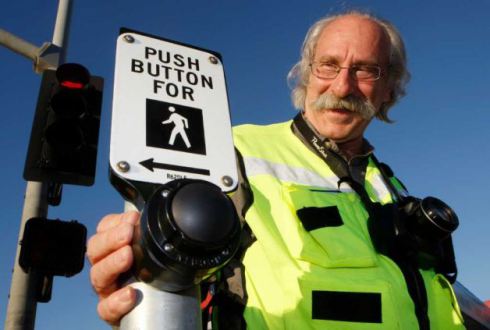You are currently browsing the tag archive for the ‘AARP’ tag.
In recent AARP research, nearly 90% of the 45+ population indicated they would like to stay in their community for as long as possible and that it is important for them to remain near their family and friends, and be able to access services they need.
Livable Communities are places where people of all ages and abilities have, among other things, a range of travel choices to get safely where they need and want to go. These choices – walking, biking, driving and public transportation – help people stay connected and healthy. In a truly livable community, streets are built for people, not for cars, and downtowns are built for lingering and enjoyment, not for vehicle thru-put and getting commuters home faster after work.
You are invited to join AARP-MI and Dan Burden, Executive Director, Walkable and Livable Communities Institute, for an Active Living Workshop on Tuesday, September 27, 2011 from 8:30am – 2:30pm at Greater Grace Temple Banquet Center, 23500 Seven Mile, Detroit, MI 48219.
The goal of this workshop is to bring community leaders, elected officials and government staff together to engage in making their streets and neighborhoods more walkable and livable. The workshop will also illustrate through examples and audits how walkablility and livability benefit a community and how they can be achieved. Each participant will be inspired to become involved in the movement of active living. The workshop will focus on building healthy communities by applying the principles of active transportation, smart growth and complete streets.
If you would like to register for or learn more about the workshop, please contact Andrea Palmer at [email protected] or 1-866-227-7448. Responses are needed by September 23, 2011.
We hope that you or your representative will participate with AARP in this important community workshop.
 The Dexter Village Council unanimously adopted a Complete Streets Ordinance Monday designed to promote safer travel for pedestrians, motorists and bicyclists. This makes the 4th Complete Streets ordinance in Michigan along with over a dozen resolutions.
The Dexter Village Council unanimously adopted a Complete Streets Ordinance Monday designed to promote safer travel for pedestrians, motorists and bicyclists. This makes the 4th Complete Streets ordinance in Michigan along with over a dozen resolutions.
As reported by Ann Arbor.com, the ordinance was developed by the American Association of Retired People and members of the Walking and Bicycling Task Force, which include the Michigan Department of Community Health, the Governor’s Council on Physical Fitness, the Michigan Department of Transportation and Consumer’s Energy.
“The goal of developing a complete streets ordinance and policy will be to continue planning, designing and engineering the village’s transportation network to serve all ages and abilities through the inclusion of all elements of transportation,” said Allison Bishop, community development manager.
Congratulations to the Village of Dexter!
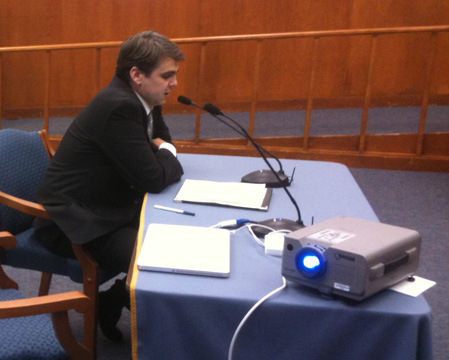
Sean Mann of Let's Save Michigan discussing the economic benefits for communities that adopt Complete Streets policies.
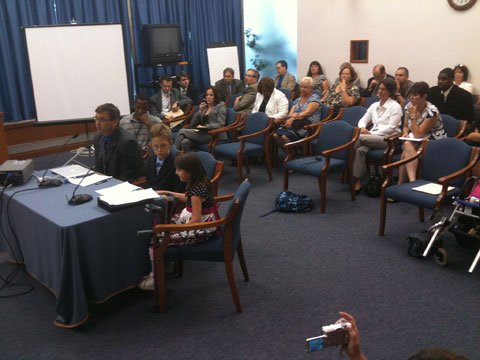
- Katie Birchmeier (10), Conor Waterman (9) and James Kleimola (18) testify in support of Complete Strees with PEAC’s John Waterman.
Complete Streets legislation, H.B. 6151 and 6152, passed* unanimously out of the Senate Transportation Committee today! The Committee had only planned on taking testimony today, but we must have won them over with a packed room, an overflowing table of written testimony and numerous articulate, well-spoken supporters. The bills will now move on to the Senate floor for a full vote.
The room was once again packed with advocates who voiced their support for Complete Streets, including organizations such as SEMCOG, Let’s Save Michigan, Mid-Michigan Environmental Action Council (Mid-MEAC) and AARP Michigan to local citizens like Lyndon Babcock and Michelle Miles. After hearing children from the Program to Educate All Cyclists (PEAC) testify, Senator Basham commented, “Certainly, Connor, Katie and James helped me make up my mind.”
The League of Michigan Bicyclists also provided the Committee with a brief powerpoint presentation, on Complete Streets. PDF versions of everyone’s testimony can be found here.
Congratulations to all of our supporters, and a special thank you to those who submitted written testimony and spoke at today’s hearing.
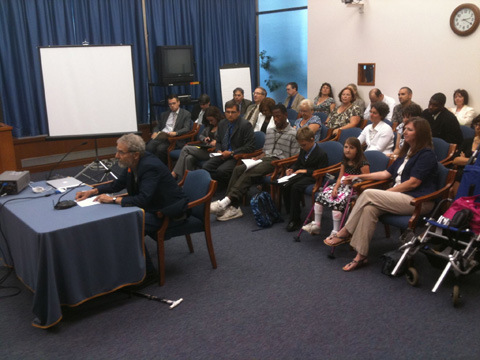
Lansing resident Lyndon Babcock speaks about the need for Complete Streets for people with disabilities.
* The Committee inadvertently excluded H.B. 6152, the second Complete Streets bill in the package, from their vote today. Chairman Gilbert said the committee will discharge H.B. 6152 out of committee with recommendation to the Senate floor.
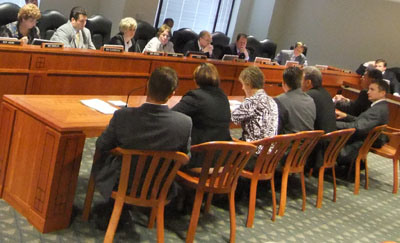
R to L: A panel of supporters including the County Road Association of Michigan, Michigan Environmental Council, Michigan Fitness Foundation, Michigan Municipal League, Michigan Trails and Greenways Alliance, AARP and Representative Jon Switalski testifying in support of HB 6151 and 6152.
The House Transportation Committee voted unanimously to pass HB 6151 and HB 6152 out of committee, with recommendations. This is a big success for Complete Streets, and the Coalition would like to thank all of the stakeholders who worked hard to negotiate a bill that was eventually able to garner such strong support. We would especially like to thank Rep. Wayne Schmidt for his leadership on this issue, as well as Rep. Pam Byrnes, Rep. John Switalski and their staffs, who put a lot of effort to achieve this victory. In hectic fashion, the final drafts of the bills were being revised right up to the last minute, modified to reflect the negotiations made between all parties involved. As Chairwoman Byrnes said, reflecting on the compromises reached, “This bill is not what everybody wants, but it’s a good step forward.”
As the result of negotiations MML, SEMCOG, MDOT and CRAM, many of whom had previously only supported the bills in concept, are now strong supporters of the legislation. The support of these organizations, in addition to the support of most of the GOP members of the committee, bodes well for the future of the bills.
The final revision of the bill no longer requires local road agencies or municipalities to pass their own Complete Streets policies. MDOT, however, is still required to pass a Complete Streets policy, along with a ‘model’ policy for municipalities and counties. As Rep. Switalski said, this version of the bill gives “cities, and locals more say when dealing with transportation policy.” The final bill also gives the Complete Streets Advisory Council a much stronger role in the planning process, allowing them to advise MDOT on the adoption of Complete Streets policies.
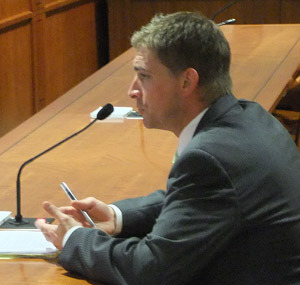
Bill sponsor, Representative Jon Switalski, makes the case for Complete Streets in Michigan before the House Transportation Committee on June 24th, 2010. The Committee went on to vote unanimously in support of the legislation.
Felicia Wasson from AARP used her brief testimony to rightly note that this is “only the beginning - a first step” for Complete Streets. According to the revision, Complete Street policies must consider the “varying mobility needs of all legal users of the roadway, of all ages and abilities.” This language does indeed represent a great first step towards ensuring that everyone is entitled to use roadways safely and conveniently.
The bills will now be referred to the House floor for a second reading, followed by a vote by the full House of Representatives. Rep. Byrnes expects that the bills will be voted on by the House relatively soon. After that, they are on to the Senate committee. It’s important to keep the energy and enthusiasm alive as the bills move forward - look for an updated action alert on our Take Action page in the next few days.
(For a complete look at the process the bills will follow as they become law, download a PDF copy of the Michigan Citizens Guide to State Government)
The Coalition would like to once again thank everyone who has worked with us to see that these bills get passed. Let’s use today’s success as a springboard to redouble our efforts, and push these important bills out of the House and through the Senate!
Additionally, League of American Bicyclists, Alliance for Biking and Walking, and the National Complete Streets Coalition all featured the efforts of Michigan’s Complete Streets movement on their blogs today.
Many more organizations and individuals provided testimony in support of Compete Streets that was entered into the record at the committee meeting as well. The following is list of links to .pdfs of those testimonies.
- Sarah Panken, Active Communities Coordinator for the Michigan Fitness Foundation
- Susan Hargter, Cyclesafe, Inc.
- Robert Prud’homme, LEED for Neighborhood Development, USGBC- Detroit Regional Chapter
- Barbara Kramer, Candidate for Dickinson County Comissioner
- MC Rothhorn, Mid-Michigan Environmental Action Council
- Jim Briggs and Carolyn Grawi, Ann Arbor Center for Independent Living
- Frank Lynn, Concerned Citizens for Improved Transit
- Dave Bulkowski, Disability Advocates of Kent County
- Gary Howe
- Michael Aughenbaugh, Revex, Inc.
- Steven A Roach
- Michael Maisner, Michigan Fitness Foundation
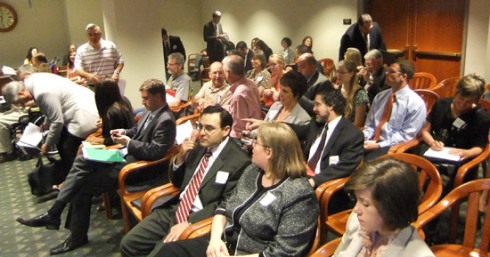
With standing room only, the room was abuzz with Complete Streets supporters on May 27th as the House Transportation Committee took testimony on HB 6151 and 6152.
It was standing room only yesterday as the House Transportation Committee took testimony on HB 6151 and 6152, Complete Streets legislation introduced by Representatives Jon Switalski and Pam Byrnes. The legislation would ensure that future road projects throughout Michigan would be required to provide safe accommodations for all roadway users such as bicyclists, pedestrians and those with disabilities.
The Coalition sincerely thanks everyone who came to the hearing and submitted testimony and cards of support. The committee members were impressed with the turnout and the amount of written testimony they received.
Providing moving testimony was Michelle Miles, mother of Jasmine Starr Miles, who was fatally struck by two cars and tragically killed in 2003 within 1,000 feet of a school zone while crossing a four lane road in Lansing. The roadway had neither crosswalks nor a sidewalk available. Cynthia Redinger of Opus International Consultants, Inc then presented a Powerpoint overview on what Complete Streets look like.
Opposition (MDOT, CRAM, MAC and MTA) is working hard to defeat these bills - as we knew they would. Their approach is that they support the concept of Complete Streets, but view these bills as an unfunded mandate. Testimony from numerous supporters of the bills, however, debunked such claims, including AARP’s Adam Goldberg and Ypsilanti Mayor Paul Schreiber who cited multiple examples of additional cost and delays in road projects in his community because of inadequate planning to accommodate nonmotorized users.
Representative Switalski’s testimony also cited recent examples in Mt. Pleasant, Kalamazoo and Traverse City where MDOT has failed to coordinate with local road agencies:
“The other component of this legislation is the coordination of the department and local road agencies on transportation projects. MDOT does great work for our state but we are asking them to do a little more when it comes to coordinating with locals on state trunklines in cities. On several occasions the department has not coordinated with local road agencies on state trunkline projects in that local road agencies’ jurisdiction.”
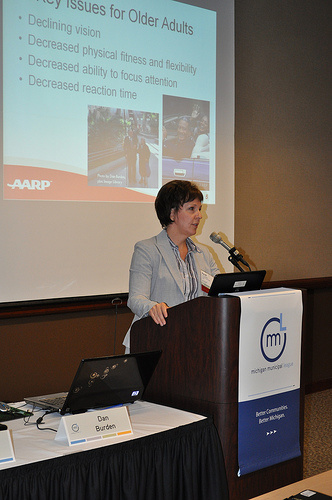
Michigan Complete Streets Coalition partner Karen Kafantaris of AARP presents on Complete Streets at the Michigan Municipal League's 2010 Capitol Conference held April 13 -14 in Lansing.
A packed room of 100+ engineers, planners and politicians attended the Complete Streets workshop at the Michigan Municipal League’s 2010 Capitol Conference held April 13 -14, 2010 in Lansing.
The panel included John Switalski (D - Warren) who spoke on pending statewide Complete Streets legislation that he plans to introduce this spring. Nationally recognized walkability expert Dan Burden also joined the discussion, as did Lansing City Council Women Jessica Yorko who recounted Lansing’s recent citizen driven Complete Streets initiative which led to the adoption of the first Complete Streets ordinance in Michigan. Michigan Complete Streets Coalition partner Karen Kafantaris of AARP rounded out the panel as she made the case for why Complete Streets are essential to mobility needs of aging Americans.
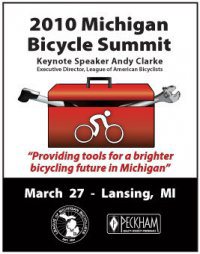 March 27th - 11:00 - 11:45am
March 27th - 11:00 - 11:45am
In the past year many exciting developments have occurred around Complete Streets in Michigan. A panel discussion at the 2010 Michigan Bicycle Summit will provide updates on these developments and provide suggestions on ways your community can go about adopting your own Complete Streets policy.
More Details/Registration:
http://www.lmb.org/index.php/events/mi-bike-summit.html
 This article originally appeared in the AARP Bulletin Today on March 1, 2010.
This article originally appeared in the AARP Bulletin Today on March 1, 2010.
Can pedestrians, cyclists and automobiles share safe streets?
Cyclists and walkers won a major victory in Lansing last year. After thousands of citizens petitioned for a ballot initiative, the Lansing city council agreed to invest about $400,000 a year to make streets safer for non-motorists.
As a next step, volunteers will conduct walkability surveys to identify areas that need work. Kafantaris said she is looking for volunteers for the Lansing survey and is building a network of activists in other cities. To join the effort, e-mail [email protected].
Elsewhere in the state: A group called Safe and Active Genesee for Everyone is pushing for a more accessible transportation network. Traverse City’s new infrastructure strategy emphasizes sidewalks and bike lanes. Marquette narrowed a downtown portion of Wright Street from four lanes to two with a center lane and four-foot bike lanes on both sides.
At the state level, lawmakers approved a 2009-10 budget last year that encourages the Department of Transportation to adopt complete streets policies and assist local governments in doing the same. Supporters hope the legislature will enact stronger legislation this year.
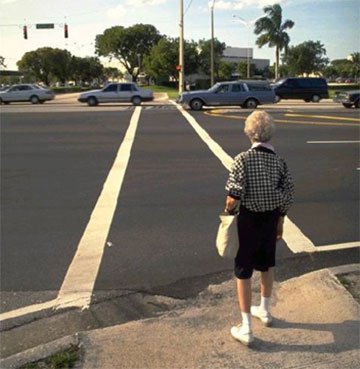
Wide streets, even with crosswalks and signals, are intimidating to older persons and can make it hard for seniors to even see the walk signal. Refuge medians that allow people to cross one direction of traffic at a time make it much easier for slower pedestrians to get around.

Wide streets, even with crosswalks and signals, are intimidating to older persons and can make it hard for seniors to even see the walk signal. Refuge medians that allow people to cross one direction of traffic at a time make it much easier for slower pedestrians to get around.
Report shows need to do more for pedestrians
Many of Michigan’s roads are getting in our way. They lack sidewalks, and too many crosswalks require a daunting six-lane sprint. Bus stops are nothing more than poles in the grass.

